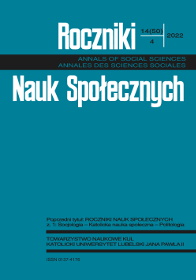Badanie społecznej akceptacji polityki transportowej przez pryzmat teorii pozycjonowania. Przypadek sesji Rady Miasta Krakowa
Abstrakt
W artykule zastosowano analizę pozycjonowania do zbadania przypadku nadzwyczajnej sesji Rady Miasta Krakowa, zwołanej w celu oceny kontrowersyjnej polityki transportowej. Pozycje to uprawnienia do wykonywania danych czynności w epizodzie. W artykule przedstawiono wzorce pozycjonowania zwolenników oraz przeciwników polityki, które wygasiły konflikt między nimi. Zidentyfikowano trzy wspólne dla obu stron narracje, które, w nieoczywisty sposób, doprowadziły do akceptacji polityki.
Bibliografia
Aronson O. (2021), Victimhood in Swedish political discourse, Discourse & Society, 32(3), pp. 292-306.
Badarneh M.A. (2020), Discourses of defense: Self and other positioning in public responses to accusations of corruption in Jordan, Discourse Studies, 22(4), pp. 399-417.
Christiansen P. (2018), Public support of transport policy instruments, perceived transport quality and satisfaction with democracy. What is the relationship?, Transportation Research Part A: Policy and Practice, 118, pp. 305-318.
Christiansen P. (2020), The effects of transportation priority congruence for political legitimacy, Transportation Research Part A: Policy and Practice, 132, pp. 61-76.
Davies B. & Harré R. (1990), Positioning: The Discursive Production of Selves, Journal for the Theory of Social Behaviour, 20(1), pp. 43-63.
Eliasson J. (2014), The role of attitude structures, direct experience and reframing for the success of congestion pricing, Transportation Research Part A: Policy and Practice, 67, pp. 81-95.
Farrington J.H. (2007), The new narrative of accessibility: its potential contribution to discourses in (transport) geography, Journal of Transport Geography, 15(5), pp. 319-330.
Gałka P., Grzelec K., Hebel K., Judge E. & Wyszomirski O. (2020), Urban public transport as a tool of sustainable mobility policy – the example of Poland, Ekonomia Międzynarodowa, 31, pp. 154-184.
Gärling T. & Loukopoulos P. (2007), Effectiveness, Public Acceptance, and Political Feasibility of Coercive Measures for Reducing Car Traffic, [in:] T. Gärling & L. Steg (eds.), Threats from Car Traffic to the Quality of Urban Life, Oxford/Amsterdam: Elsevier, pp. 313-324.
Harré R. (2009), The Siren Song of Substantivalism, Journal for the Theory of Social Behaviour, 39(4), pp. 466-473.
Harré R., Moghaddam F.M., Cairnie T.P., Rothbart D. & Sabat S.R. (2009), Recent Advances in Positioning Theory, Theory & Psychology, 19(1), pp. 5-31.
Harré R. & Slocum N. (2003), Disputes as Complex Social Events: On the Uses of Positioning Theory, Common Knowledge, 9(1), pp. 100-118.
Henriksson M., Witzell J. & Isaksson K. (2019), All Change or Business as Usual? The Discursive Framing of Digitalized Smart Accessibility in Sweden, Transportation Research Procedia, 41, pp. 625-636.
Herbel-Eisenmann B., Sinclair N., Chval K.B., Clements D.H., Civil M., Pape S.J., Stephan M., Wanko J.J. & Wilkerson T.L. (2016), Research Committee: Positioning Mathematics Education Researchers to Influence Storylines, Journal for Research in Mathematics Education, 47(2), pp. 102-117.
Holden E., Banister D., Gössling S., Gilpin G. & Linnerud K. (2020), Grand Narratives for sustainable mobility: A conceptual review, Energy Research & Social Science, 65, pp. 1-10.
Holguín-Veras J., Encarnación T. & González-Calderón C.A. (2020), User perception of fairness of time-of-day pricing and other typical toll discounts, Transportation Research Part A: Policy and Practice, 137, pp. 560-581.
Kallenbach T. (2020), Narratives of urban mobility in Germany: on the threshold of a departure from the car-centered city?, Sustainability: Science, Practice, and Policy, 16(1), pp. 197-207.
Kayi-Aydar H. (2019), Positioning Theory in Applied Linguistics, [b.m.w.]: Palgrave Macmillan.
Liu Q., Lucas K. & Marsden G. (2021), Public acceptability of congestion charging in Beijing, China: How transferrable are Western ideas of public acceptability?, International Journal of Sustainable Transportation, 15(2), pp. 97-110.
Martens K. (2016), Transport Justice, New York: Routledge.
Martens K. (2020), How just is transportation justice theory? The issues of paternalism and production: A comment, Transportation Research Part A: Policy and Practice, 133, pp. 383-386.
Morton C., Mattioli G. & Anable J. (2021), Public acceptability towards Low Emission Zones: The role of attitudes, norms, emotions, and trust, Transportation Research Part A: Policy and Practice, 150, pp. 256-270.
Okraszewska R., Romanowska A., Wołek M., Oskarbski J., Birr K. & Jamroz K. (2018), Integration of a multilevel transport system model into sustainable Urban mobility planning, Sustainability, 10(2), pp. 1-20.
Pridmore A. & Miola A. (2011), Public acceptability of sustainable transport measures: A review of the literature (International Transport Forum Discussion Paper, No. 2011-20), https://doi.org/10.1787/2223439X.
Rinkinen J., Shove E. & Marsden G. (2021), Conceptualising Demand A Distinctive Approach to Consumption and Practice. New York: Routledge.
Roth P.A. (2017), Essentially narrative explanations, Studies in History and Philosophy of Science Part A, 62, pp. 42-50.
Selmoune A., Cheng Q., Wang L. & Liu Z. (2020), Influencing Factors in Congestion Pricing Acceptability: A Literature Review, Journal of Advanced Transportation, pp. 1-11.
Sosa López O. & Montero S. (2018), Expert-citizens: Producing and contesting sustainable mobility policy in Mexican cities, Journal of Transport Geography, 67, pp. 137-144.
Van Der Meulen J. & Mukhtar-Landgren D. (2021), Deconstructing accessibility–discursive barriers for increased cycling in Sweden, Mobilities, 16(4), pp. 493-508.
Vanoutrive T. & Cooper E. (2019), How just is transportation justice theory? The issues of paternalism and production, Transportation Research Part A: Policy and Practice, 122, pp. 112-119.
Vanoutrive T. & Zijlstra T. (2018), Who has the right to travel during peak hours? On congestion pricing and 'desirable' travellers, Transport Policy, 63, pp. 98-107.
Wagner D. & Herbel-Eisenmann B. (2009), Re-mythologizing mathematics through attention to classroom positioning, Educational Studies in Mathematics, 72(1), pp.1-15.
Wallsten A., Henriksson M. & Isaksson K. (2021), The Role of Local Public Authorities in Steering toward Smart and Sustainable Mobility: Findings from the Stockholm Metropolitan Area, Planning Practice & Research, 37(5), pp. 532-546.
Zanin A.C. & Bisel R.S. (2018), Discursive Positioning and Collective Resistance: How Managers Can Unwittingly Co-Create Team Resistance, Management Communication Quarterly, 32(1), pp. 31-59.
Copyright (c) 2022 Roczniki Nauk Społecznych

Utwór dostępny jest na licencji Creative Commons Uznanie autorstwa – Użycie niekomercyjne – Bez utworów zależnych 4.0 Międzynarodowe.


